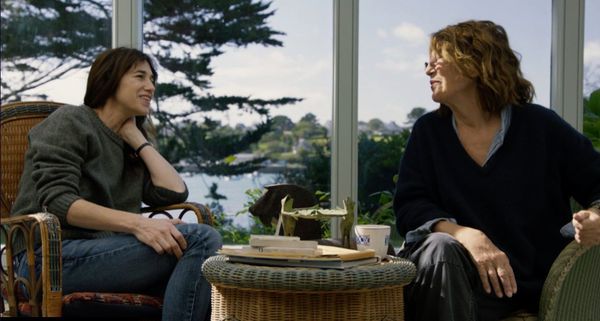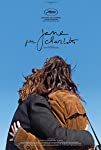Eye For Film >> Movies >> Jane By Charlotte (2021) Film Review
Jane By Charlotte
Reviewed by: Anne-Katrin Titze

The Jane Birkin who emerges in Charlotte Gainsbourg’s Jane By Charlotte (Jane Par Charlotte, a highlight in the Spotlight programme of the 59th New York Film Festival) is different from the one known from stage and screen, different from the one profiled by Agnès Varda in Jane B. Par Agnès V. The difference lies in the intimacy and daring in Gainsbourg’s questioning and in her desire to capture the fleeting and preserve what cannot be preserved.
Taking a good, hard look at your mother is a dangerous endeavor for anyone. Gainsbourg expresses it this way: “The idea is to look at you how I never dared look at you before.” During a concert tour in Japan, with fans asking for autographs and a tea ceremony being completed, a startling confession sets the tone for the entire film. “We both have a shyness when we’re together,” mother and daughter agree. Other than her sisters Kate and Lou, we learn that Charlotte was “intimidating,” even as a young child. “Much more mysterious to me,” says Birkin, as “you were so private.” The discrepancy is breathtaking; shyness and exposure are invited to dance.
What does it mean to be the middle child of three, as both Jane and Charlotte are? Agility comes to mind, and, says Gainsbourg “a lot of jealousy, always counting and checking that things are fair.”
The closer and more personal this documentary gets, the more it opens up to the largest of issues. Sibling rivalry is followed by another fairy-tale trope that has been concerning us for centuries, namely vanity. We get to see many family photos and a lot of Jane Birkin’s beautiful, endlessly fascinating face. She speaks about aging, how an elephant-knee face is fine on others, and how she herself feels the physical changes over the past two years and earlier on, after the death of her daughter Kate Barry. Gainsbourg’s camera lovingly pauses at closeups of hands, eyes, a smile.
Jane speaks of good mirrors and bad ones (never cut your own hair with kitchen scissors in a flattering mirror, she warns) and “the moment when you don’t recognise yourself, then take off your glasses, and there you are.” You cannot help but think of a very different horror, namely that of famous faces that have undergone plastic surgery and who are confronted with the impossibility of ever seeing their aged face.
Mother and daughter have a conversation on a rooftop in New York City, where Charlotte lives and Jane performs at the Beacon Theatre. “Varda was right”, says Birkin, “you have to capture the present.” They sing together on stage, have a salmon feast at Russ & Daughters, and talk serious bull terrier business. Yvan Attal, Gainsbourg’s partner and father of her children, is not seen in the film at all, merely mentioned a few times, mostly in connection with being an obstacle to getting a puppy for the family. The teleprompter as an invaluable invention, and crippling stage fright come up and Charlotte wonders about her mother’s faith in people.
Joined by Charlotte’s youngest daughter Jo, three generations roam around Birkin’s house and garden in Brittany. She is incapable of throwing anything away, so the house has a museum quality, an enchanted one with Russian dolls on the mantle and a wooden toy horse at hand when needed. Jo brought seeds to plant Morning Glories. There are rabbits in the garden.
Another journey leads to Serge Gainsbourg’s apartment in Paris, frozen in time. Going there is a dreamlike experience for Jane, “like Pompeii.” Charlotte explains how in her father’s kitchen all the old cans exploded, as we see some assorted vegetable and pea soup cans. Flacons of Guerlain perfumes, a very low-hanging chandelier in the bathroom, photographs of Catherine Deneuve, Brigitte Bardot, Marilyn Monroe, a black sculpture of Jane, Serge’s gold records - a place to time travel. “It’s like Sleeping Beauty,” says Jane who spent “12 very happy years” in the apartment, but has never before been back.
The pandemic enters the film, as is the case so often right now, in the form of the COVID face mask when Jane helps to check out a possible new puppy near Saint-Brieuc (and clearly bonds with it). Dog names are being discussed with Jo. Daisy, Ruby, Sugar, lose out to Poppy, but we don’t know what will happen on the dog front, because that, I suspect, would be too intimate and personal for us to know.
Life and death, illness and Jane’s insomnia since early childhood are on the table, as are family films and photos. And stories, always stories. “We make up stories and start to think they are the truth and start to fear real stories.” We are all haunted and haunting. “The more I look at you, the more I love you,” says Charlotte. “I wish I were like you,” and “I need you to teach me to live.”
Reviewed on: 02 Oct 2021














